1. 서 론
최근 세계적으로 기후변화로 인해 태풍, 홍수와 같은 기상재해가 급격히 증가하고 있는 추세이다(
National River Commission, 2010). 우리나라에서도 매년 태풍과 호우 등에 따른 침수피해가 반복적으로 발생하고 있다. 또한, 도시화와 산업화로 인해 주거건물, 산업자산 등이 확산됨에 따라 도심지역에서도 홍수로 인한 인명, 재산 피해도 커지고 있는 실정이다(
Lim, 2019). 현재 정부에서는 홍수피해 규모를 저감하기 위한 치수사업에 투입할 예산을 효율적으로 사용하기 위해 투자우선순위평가를 통해 사업지구를 선별하고 있다. 투자우선순위평가는 정량적 평가와 정성적 평가로 이루어져 있으며, 그중 정량적 평가에 해당하는 경제성 분석은 사업 시행 후 피해저감으로 얻을 수 있는 경제적 편익을 산정하는 방법이기 때문에 투자우선순위평가에서 매우 중요한 부분을 차지한다. 본 연구에서는 치수경제성 평가모형으로 2004년에 개발된 다차원 홍수피해 산정 기법(이하 다차원법)을 사용하여 경제성 분석을 실시하였다. 하지만 다차원법에서 사용하는 공간분석자료인 토지피복도는 구현된 건물의 해상도와 자료 갱신주기 등에서 한계를 가지고 있다. 이러한 토지피복도의 한계를 개선하고자 최근 국내의 경우
Wang (2020)과
MOIS (2020)에서는 토지피복도 대신 신규 공간분석자료인 도로명주소 전자지도를 통해 공간분석을 수행하여 경제성 평가를 실시했다. 하지만 다차원법은 행정구역 단위로 통계자료를 조사하여 일반자산 피해액을 산정하는데, 행정구역의 경우 모양과 크기가 불규칙하고 시간이 변함에 따라 행정경계가 조정될 수 있는 문제점이 있다(
Kim and Lee, 2015). 또한, 가장 작은 단위인 읍면동의 경우 비교적 넓은 공간 단위로 정보를 제공하기 때문에 집계구나 지구 단위와 같은 미시적 공간 단위의 경제성 분석을 수행할 경우에는 어려움이 있다(
Hwang et al., 2021). 따라서 본 연구에서는 이러한 다차원법의 한계를 보완할 수 있는 국토교통부에서 제공하고 있는 격자단위 공간분석자료(이하 격자자료)를 사용하여 경제성 분석을 수행하였다.
격자자료를 재난관련 분야에 적용한 사례로
Chen et al. (2005)은 대만 북부의 지역 홍수 피해 평가를 위해 격자 기반의 GIS 접근방식을 제안했고, 초과 확률 곡선과 연 평균 홍수 손실 개념을 사용하여 지역 홍수를 위험 계획 및 관리와 결합하기 위한 체계를 개발했다.
Price et al. (2012)은 영국과 웨일스의 홍수 위험 예측을 제공하기 위해 보정된 수문학적 모델인 grid-to-grid를 구현하여 제시하였다. 이 모델을 2009년 11월에 발생한 Cumbria 홍수에 적용한 결과, 해당 모델이 긴 리드타임을 가진 홍수를 예측하는데 효과적인 접근방식임을 검증했다. 그리고 일본의 경우에는 치수 경제 조사 매뉴얼을 살펴보면 인구, 침수 구역 내 자산가치 등을 격자 통계자료로 산출하여 침수 피해액을 산정하고 있음을 알 수 있다(
MLIT, 2005). 이와 같이 해외에서는 국내보다 이른 시기에 격자자료의 중요성을 파악하여 홍수 피해 평가와 홍수 예측 모델에 적용하고 있다. 최근에는 국내에서도 이러한 격자자료의 중요성이 대두되고 있는데, 관련 연구들을 살펴보면
Hwang et al. (2021)은 태풍 피해를 감소시키기 위해 예방과 대비 단계에서 표준화된 격자를 활용할 수 있도록 활용방안을 제시하였으며, 연구결과를 통해 격자의 실효성을 확인하였다. 또한,
Wang et al. (2020)은 2018년 기준 경기도 31개 시군을 대상으로 도로명주소 전자지도와 건축물수 격자자료를 사용해서 침수피해 범위 내에 위치한 격자단위 동계값을 활용한 홍수위험도 평가를 실시하였다.
Yu et al. (2018)은 대구광역시, 울산광역시, 경상북도, 강원도 지역에 대해 침수심, 인구밀도, 재해취약인구비율 등과 같은 지역 특성지표를 고려하여 격자기반의 수해 위험지도를 작성하였다.
격자자료 기반 국내 연구를 살펴보면 격자자료를 활용하여 정성적 평가는 시도하고 있는 반면 상대적으로 정량적 평가에 대한 연구는 부족한 상황이다. 따라서 본 연구에서는 격자자료를 활용하여 태풍 차바로 인한 울산광역시의 침수 피해에 대해 다차원법을 적용해 정량적 평가를 실시하여 해당 자료가 경제성 분석에 적합한지 평가해 보았다. 그리고 격자자료를 중심점 방식과 면적비 방식으로 각각 적용하여 다차원법에 적합한 격자자료 적용방식에 대해서도 추가적으로 검토해 보았다.
2. 연구 방법론
2.1 경제성 평가모델 : 다차원 홍수피해산정기법(MD-FDA)
국내에서 경제성분석을 위한 홍수피해산정은 하천시설기준에 간편법이 제시되면서 시작되었다(
MOCT, 1993). 이 방법은 농작물 피해액을 산정한 후 나머지 피해항목들을 대상지역의 농작물 피해액 경험식에 근거한 비율 계수를 적용하여 각각 산정한다. 간편법을 개선한 모델인 개선법은 과거 피해 자료를 통해 유도된 도시유형별 침수면적-피해액 회귀식을 사용하여 대상지역의 사업경제성을 평가하는 방법이다. 개선법은 도시규모별로 침수피해를 고려하여 건물, 인명, 공공시설물 피해 등 다양한 피해액을 산정할 수 있다는 장점이 있다. 하지만, 피해액을 침수면적만을 고려한 함수식으로 산정하기 때문에 공간분석자료를 활용하여 얻을 수 있는 침수편입률과 침수심에 따른 피해율을 평가에 반영하지 못한다는 한계가 있다. 이에 개선법이 가지고 있는 한계점을 보완하고자 건설교통부에서 제안한 경제성 평가모델이 다차원 홍수피해산정기법이다(
MOCT, 2004).
다차원법에서 직접피해액 항목은 5개의 일반자산 피해항목(건물, 건물내용물, 농경지, 농작물, 산업자산(유형⋅재고))과 인명피해 및 공공시설물 피해로 총 7가지로 구성되어 있다. 다차원법에서 피해액 산정에 사용되는 침수편입률은 해당 행정구역내 유형별 전체 자산가치 면적에 대한 침수된 자산가치의 면적을 의미한다. 일반자산 피해는 대상지역의 자산가치에 침수편입률과 침수심에 따른 피해율을 적용하여 피해액을 산정한다. 인명피해는 인명손실과 이재민피해로 구분되며, 여기서 인명손실은 침수면적당 손실 인명수에 행정구역별 침수면적과 1인당 손실액(손실 원단위)을 곱하여 산정할 수 있다. 이재민 피해는 대상지역 총인구수(실거주 인구수)에 주거건물에 대한 침수편입률을 곱한 후, 평균 대피일수와 기준년도 일 최저임금을 적용하여 산정한다. 공공시설물(도로, 교량, 하수도 등) 피해는 일반자산 피해와 달리 범위와 규모로 볼 때 공간분석을 활용한 피해액 산정이 어렵기 때문에 일반자산 피해액에 비율계수 1.694를 곱하여 산정한다.
2.2 토지피복도와 도로명주소 전자지도
다차원법에서는 공간분석자료로 환경공간정보서비스에서 제공하는 토지피복도를 사용하는데, 토지피복도는 주거건물, 비주거건물, 농경지 등 경제성 분석에 필요한 다양한 유형의 자산가치들이 폴리곤의 형태로 구현되어 있다. 하지만 토지피복도는 아파트 단지 내 도로, 편의시설 등을 포함한 군집 형태의 공간분석자료이며, 자료의 해상도가 낮기 때문에 정확한 피해액 산정에 어려움이 있다. 또한, 자료 갱신이 정기적으로 이루어지지 않기 때문에 기준연도별로 분석에 필요한 공간분석자료를 구축하는 데 한계가 있다. 이러한 점을 보완할 수 있는 공간분석자료로 도로명주소 전자지도가 있는데, 해당 자료는 한 달 마다 전국단위로 갱신되며 건물이 군집형태가 아닌 개별 객체 단위의 폴리곤 형태로 구현되어 있기 때문에 토지피복도를 사용했을 때보다 정확한 피해액 산정이 가능하다. 실제 위성지도와 도로명주소 전자지도를 중첩해 보면, 도로명주소 전자지도 상에 실제 건물의 위치와 모양이 잘 반영되어 있음을 알 수 있다. 그리고 토지피복도는 단독주거시설, 공동주거시설로 구분되어 있어 주거건물 피해액 산정 시 건축단가를 적용하는 데 있어 적합하지 않았는데 반해, 도로명주소 전자지도는 건물이 단독주택, 아파트, 연립주택, 다세대주택 등으로 구분되어 있어 건물유형별로 세분화된 피해액 산정이 가능하다. 따라서 본 연구에서는 도로명주소 전자지도를 사용하여 산정한 피해액 결과를 경제성 분석에서의 격자자료 사용에 대한 타당성을 확인하는 기준자료로 사용했다.
Fig. 1은 울산광역시 도로명주소 전자지도의 건물 폴리곤을 나타낸 것이다.
Fig. 1
Ulsan Residential Road Name Address Digital Map Building Polygon

2.3 신규 공간분석자료 : 격자단위 공간분석자료
국토교통부의 국토정보지리원에서 관리하는 국토정보플랫폼에서는 행정구역별로 인구, 건축물수, 공시지가 등의 통계자료들을 격자단위 공간분석자료(.shp)의 형태로 제공하고 있다. 격자자료는 행정구역의 제약 없이 대상지역을 설정하여 공간분석이 가능하다. 그리고 토지피복도와 도로명주소 전자지도와 달리, 격자단위 공간분석자료는 인구, 건물 등 다양한 유형의 자료들을 속성값으로 설정할 수 있어
Fig. 2와 같이 울산광역시 중구의 건축물수 격자자료를 직관적인 통계지도로 구축할 수 있다.
Fig. 2
Jung-gu Inundation Trace Map by Typhoon Chaba and Building Number Grid Data
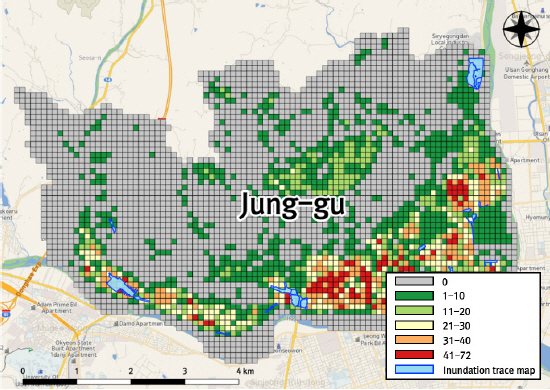
국토정보플랫폼에서 제공하는 격자단위 통계자료는 건물 및 산업자산가치 산정 등에 필요한 가구수, 건축형태별 건물면적, 종사자수, 총인구수 등과 같은 통계자료는 제공하고 있지 않다. 따라서 본 연구에서는 국토정보플랫폼에서 제공하는 격자 폴리곤 자료를 기본 베이스로 하여 도로명주소 전자지도와 통계자료로 만든 새로운 속성값을 가진 격자자료로 경제성 분석을 수행하였다. 그리고 여기서 국토정보플랫폼에 제공하는 총인구수 자료는 주민등록인구수를 나타내기 때문에 다차원법에서 사용하는 총인구수 개념과는 맞지 않다. 따라서 본 연구에서는 국가통계포털에서 제공하는 총인구수(실거주인구수) 자료를 활용하여 분석을 수행하였다.
Fig. 3은 국토정보플랫폼에서 제공하는 울산광역시의 격자 폴리곤자료를 나타낸 것이다.
Table 1은 격자단위 건물, 건물내용물, 산업자산 자산가치와 총인구수를 산정하는 식을 나타낸 것이다.
Table 1
Equation for Calculating Asset Value and Total Populations in Grid Unit
|
Building asset valve in grid unit |
Number of families in grid unit × Average unit price by building type (won/m2) × ∑ (Average total floor area × Number of families ratio by cities and countries, building type, and total floor area) |
Number of families in grid unit
= (Total number of families / Total building area by cities and countries and building type)
× Building area in grid unit by building type |
|
Building contents asset value in grid unit |
Number of households in grid unit × Amount of household assets (won/households) |
Number of households in grid unit
= (Number of households / Number of families by cities and countries)
× Number of families in grid unit |
|
Industrial asset value in grid unit |
Number of workers in grid unit × (Total industrial asset value / Total number of workers by cities and countries) |
Number of workers in grid unit
= (Total number of workers by cities and countires / Total building area of industrial assets)
× Building area of industrial assets in grid unit |
|
Number of total populations in grid unit |
(Total populations / Total residential building area by cities and countries)
× Total residential building area in grid unit |
Fig. 3
Residential Road Name Address Digital Map and Ulsan 100 × 100 m Grid Data
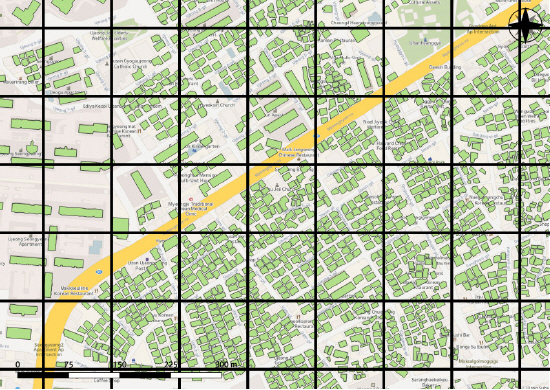
본 연구에서는 이와 같이 산정한 격자단위 자산가치 및 총인구수 통계자료에 중심점 방식과 면적비 방식에 따라 침수편입률과 침수피해율을 각각 다르게 적용하여 피해액을 산정했다. 중심점 방식은 격자단위 중심점이 침수구역에 포함될 때 해당 격자단위의 건물, 산업자산 전체가 침수되었다고 판단하는 방법이다. 그리고 개별격자의 중심점이 포함되어 있는 침수심에 따라 침수피해율을 적용하여 피해액을 산정했다. 면적비 방식은 격자단위 침수편입률과 침수심별 침수피해율을 각각 적용해 피해액을 산정하는 방식이다. 그리고 이재민 피해액의 경우 중심점 방식은 개별격자의 중심점이 침수구역에 포함될 때 해당 격자의 실거주하고 있는 인구수를 이재민으로 계산하여 피해액을 산정했다. 면적비 방식에서는 격자단위 침수편입률을 곱해주어 이재민수를 산정하였다.
3. 태풍 차바에 의한 울산광역시 피해액 산정
3.1 연구 대상지역
울산광역시는 한반도의 동남쪽에 위치하고 있는 지역으로 5개의 시군구(중구, 남구, 동구, 북구, 울주군)로 구성되어 있다. 울산광역시의 2001~2010년 연평균강수량은 1,446.0 mm로 우리나라 평균인 1,358.5 mm보다 87.5 mm 더 많다(
KMA, 2017). 특히 울산광역시는 2016년 발생한 태풍 차바로 인한 침수피해가 전국에서 가장 심하게 발생한 지역으로, 북구와 울주군은 특별재난지역으로 선포되었으며 시간당 104.2 mm의 최대 강우량이 발생하였다(
MOIS, 2017).
울산광역시의 행정구역 중에서 태풍 차바로 인한 침수피해 사례를 살펴보면, 중구의 경우 우정혁신도시 공사 진행 과정에서 배수 시설 등 홍수 피해를 예방하기 위한 대책 수립의 미흡으로 큰 피해가 발생하였고, 그밖에 유곡동, 태화시장, 우정동 등에서도 침수 피해가 연달아 발생하였다. 또한 남구에서는 여천천과 무거천, 울주군의 삼동천과 대복천 등 주요 지역에 위치한 소하천이 모두 범람하면서 주변 주택과 상업 및 공업지역에서도 큰 피해가 발생하였다.
본 연구에서는 태풍 차바로 인한 울산광역시의 침수흔적도를 사용하여 공간분석자료 유형별로 실시한 경제성 분석 결과를 검토해 보았다. 이를 통해 본 연구에서 사용한 격자단위 공간분석자료가 기존 공간분석자료를 대체할 수 있는지에 대한 적용성 및 타당성을 분석해 보았다.
Fig. 4는 태풍 차바에 의한 울산광역시 중구의 침수흔적도와 토지피복도에서 추출한 주거건물, 비주거건물, 논, 밭을 지도에 표시한 것이다.
Fig. 4
Jung-gu Inundation Trace Map by Typhoon Chaba and Land Cover Map
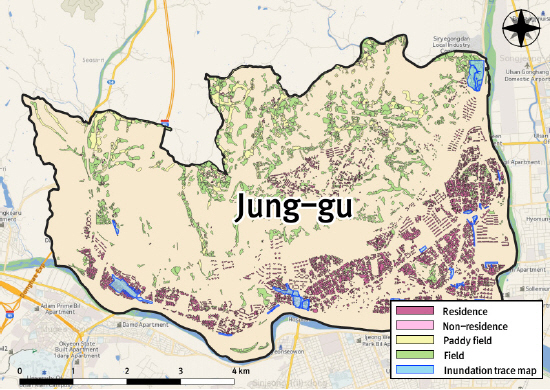
3.2 건물⋅건물내용물 피해액
Tables 2와
3은 울산광역시 시군구별 건물, 건물내용물 자산가치와 공간분석자료 유형과 산정방식에 따른 피해액을 나타낸 것이다.
Table 2
Residential Building Asset Value and Damages by Ulsan Cities and Countries
|
Rank (unit : 103 won) |
Residential building asset value |
Residential building damages |
|
Land cover map |
Road name address digital map*
|
Grid (central point) |
Grid (area ratio) |
|
1 |
Nam-gu |
Nam-gu |
Nam-gu |
Nam-gu |
Nam-gu |
|
11,765,854,287 |
157,684,852 |
122,382,974 |
116,597,532 |
114,154,870 |
|
2 |
Jung-gu |
Jung-gu |
Jung-gu |
Jung-gu |
Jung-gu |
|
8,473,008,968 |
43,932,881 |
48,104,201 |
51,404,011 |
52,622,342 |
|
3 |
Ulju-gun |
Buk-gu |
Buk-gu |
Buk-gu |
Buk-gu |
|
7,704,342,413 |
28,237,440 |
24,651,193 |
24,291,511 |
24,956,713 |
|
4 |
Buk-gu |
Ulju-gun |
Ulju-gun |
Ulju-gun |
Ulju-gun |
|
6,344,063,542 |
11,618,272 |
9,256,628 |
9,944,683 |
8,909,764 |
|
5 |
Dong-gu |
Dong-gu |
Dong-gu |
Dong-gu |
Dong-gu |
|
5,717,568,504 |
- |
- |
- |
- |
Table 3
Residential Building Contents Asset Value and Damages by Ulsan Cities and Countries
|
Rank (unit : 103 won) |
Residential building contents asset value |
Residential building contents damages |
|
Land cover map |
Road name address digital map*
|
Grid (central point) |
Grid (area ratio) |
|
1 |
Nam-gu |
Nam-gu |
Nam-gu |
Nam-gu |
Nam-gu |
|
1,319,052,332 |
10,794,648 |
8,814,329 |
8,531,782 |
8,354,146 |
|
2 |
Jung-gu |
Jung-gu |
Jung-gu |
Jung-gu |
Jung-gu |
|
942,486,832 |
3,405,894 |
3,640,005 |
3,941,009 |
4,020,324 |
|
3 |
Ulju-gun |
Buk-gu |
Buk-gu |
Buk-gu |
Buk-gu |
|
861,017,874 |
1,805,258 |
1,754,442 |
1,723,448 |
1,780,339 |
|
4 |
Buk-gu |
Ulju-gun |
Ulju-gun |
Ulju-gun |
Ulju-gun |
|
693,143,180 |
1,034,971 |
816,048 |
932,820 |
804,804 |
|
5 |
Dong-gu |
Dong-gu |
Dong-gu |
Dong-gu |
Dong-gu |
|
677,759,407 |
- |
- |
- |
- |
먼저 울산광역시 행정구역별로 건물⋅건물내용물 자산가치를 산정한 결과 남구, 중구, 울주군, 북구, 동구 순으로 크게 산정되었다. 이와 같이 산정된 건물 자산가치에 따른 피해액은 공간분석자료의 유형과 적용방법에 상관없이 남구, 중구, 북구, 울주군, 동구 순으로 크게 산정되었다. 여기서 동구의 경우에는 침수가 발생하지 않았기 때문에 피해액은 산정되지 않았다.
Tables 2와
3을 살펴보면, 건물⋅건물내용물 자산가치가 큰 시군구일수록 건물⋅건물내용물 피해액이 크게 산정된다는 것을 알 수 있다. 하지만 북구와 울주군의 경우, 건물⋅건물내용물 자산가치 순위와 피해액의 순위가 동일하게 나타나지 않았다. 울주군은 다른 행정구역들과 비교했을 때 행정구역의 넓이는 가장 크지만, 건물밀도가 5개 행정구역 중에서 가장 작다. 따라서 침수가 발생한 피해지역에 건물이 넓게 분포되어 있어 건물 자산가치의 크기 대비 피해액이 작게 산정된 것이다. 북구는 울주군보다 주거건물수 및 가구수가 적어 건물 자산가치는 작게 산정되었지만, 북구에서 홍수가 발생한 소하천(동천, 호계천, 무룡천, 신명천) 주변에서 주거건물이 울주군보다 밀집되어 있기 때문에 건물 피해액이 더 크게 산정되었다.
남구의 경우에는 다른 행정구역보다 토지피복도와 도로명주소 전자지도로 산정한 건물 피해액이 격자자료를 이용하여 산정한 건물 피해액에 비해 크게 산정되었다. 남구에서는 특히 주거 밀집지역에 형성된 격자들의 중심점이 침수흔적도에 포함되어 있지 않은 경우가 많이 존재했다(
Fig. 5). 또한 격자단위 내에 있는 건물 대부분이 침수흔적도에 포함되어 있는 경우가 많아 면적비 방식에서는 격자단위 피해액이 작게 산정되었다(
Fig. 6). 이와 같은 이유로 남구의 경우에는 격자자료로 산정한 피해이 작게 산정되었다.
Fig. 5
The Flooded Area that does not include the Central Point of the Grid
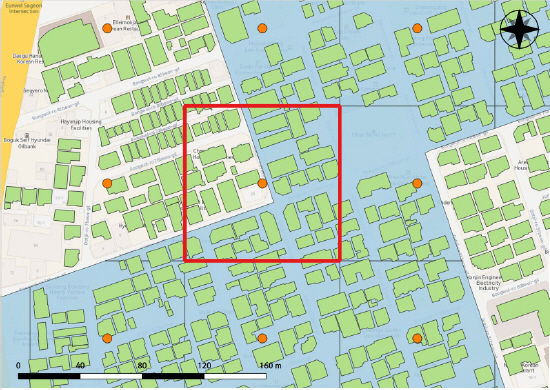
Fig. 6
Residential Buildings in the Unit Grid included in the Inundation Trace Map

기준자료인 도로명주소 전자지도로 산정한 건물⋅건물내용풀 피해액 산정 결과와 토지피복도, 격자자료(중심점, 면적비)로 산정한 피해액을 비교했을 때, 대부분의 시군구에서 격자자료(중심점, 면적비)로 산정한 피해액 결과가 도로명주소 전자지도로 산정한 피해액 결과와 가장 근사하게 산정되었다.
3.3 산업자산(유형⋅재고) 피해액
건물 피해액이 해당 지역의 주거건물 피해액을 산정한 것이라면 산업자산 피해액은 비주거건물 피해액을 산정한 것이다. 비주거건물은 상업 및 공업 지역에 위치한 제1종 근린생활시설, 공장 등을 포함해서 관공서, 병원 등의 건물을 말하며, 피해액 산정방법은 건물 피해액 산정과정과 동일하다.
Table 4는 울산광역시 시군구별 산업 자산가치와 공간분석자료 유형에 따라 산정된 피해액을 나타낸 것이다.
Table 4
Industrial Building Asset Value and Damages by Ulsan Cities and Countries
|
Rank (unit : 103 won) |
Industiral building asset value |
Industrial building damages |
|
Land cover map |
Road name address digital map*
|
Grid (central point) |
Grid (area ratio) |
|
1 |
Buk-gu |
Nam-gu |
Buk-gu |
Buk-gu |
Buk-gu |
|
60,878,658,276 |
506,014,181 |
649,758,730 |
650,582,218 |
658,082,624 |
|
2 |
Ulju-gun |
Buk-gu |
Nam-gu |
Nam-gu |
Nam-gu |
|
56,876,073,978 |
417,889,374 |
515,527,083 |
483,529,408 |
478,784,434 |
|
3 |
Dong-gu |
Jung-gu |
Jung-gu |
Jung-gu |
Jung-gu |
|
52,392,224,820 |
185,394,047 |
176,507,224 |
179,450,017 |
155,485,668 |
|
4 |
Nam-gu |
Ulju-gun |
Ulju-gun |
Ulju-gun |
Ulju-gun |
|
45,536,213,807 |
89,089,837 |
153,867,080 |
138,750,506 |
136,324,738 |
|
5 |
Jung-gu |
Dong-gu |
Dong-gu |
Dong-gu |
Dong-gu |
|
8,780,960,050 |
- |
- |
- |
- |
시군구별 공간분석자료에 따른 산업자산 피해액을 살펴보면 남구, 북구, 울주군의 경우 토지피복도보다 도로명주소 전자지도를 사용했을 때 산업자산 피해액이 더 크게 산정되었다. 이는 침수가 발생한 지역의 토지피복도에 미구현된 건물 폴리곤이 많이 존재해 토지피복도의 침수편입률이 도로명주소 전자지도보다 작게 산정되었기 때문이다. 그리고 중구의 경우 중심점 방식으로 산정한 산업자산 피해액이 면적비 방식으로 산정한 피해액보다 크게 산정되었다.
Fig. 7의 사례와 같이 침수흔적도 내에 비주거건물 대부분이 포함되어 있지만, 격자단위와 침수흔적도가 일부분만 중첩되어 있는 경우가 많이 존재해 면적비 방식으로 산정한 피해액이 작게 산정되었다.
Fig. 7
The Flooded Area That Includes the Central Point and Most of the Industrial Buildings of the Grid
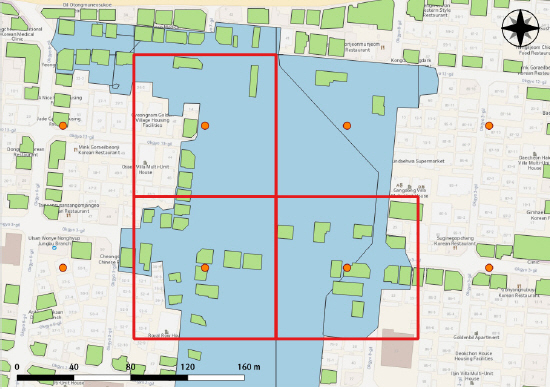
건물⋅건물내용물 피해액과 마찬가지로 기준자료인 도로명주소 전자지도로 산정한 피해액과 토지피복도, 격자자료(중심점, 면적비)로 산정한 피해액을 비교했을 때, 격자자료로 산정한 피해액 결과가 도로명주소 전자지도로 산정한 피해액 결과와 가장 유사하게 산정되었다.
3.4 인명손실⋅이재민피해액
Table 5는 인명손실(사망자⋅부상자) 피해액과 이재민 피해액을 나타낸 것이다. 인명손실 피해액은 북구, 울주군, 남구, 중구, 동구 순으로 크게 산정되었다. 다차원법에서 시군구별 인명손실 피해액은 공간분석자료의 유형에 상관없이 침수면적 크기에만 영향을 받아 산정되었다.
Table 5
Human Damages by Ulsan Cities and Countries
|
Rank (unit : 103 won) |
Loss of life damages |
Flood victims damages |
|
Land cover map |
Road name address digital map*
|
Grid (central point) |
Grid (area ratio) |
|
1 |
Buk-gu |
Nam-gu |
Nam-gu |
Nam-gu |
Nam-gu |
|
3,610,673 |
25,639,560 |
20,764,908 |
20,334,278 |
19,795,375 |
|
2 |
Ulju-gun |
Buk-gu |
Buk-gu |
Jung-gu |
Jung-gu |
|
3,308,208 |
6,733,339 |
4,431,326 |
5,051,397 |
5,166,722 |
|
3 |
Nam-gu |
Jung-gu |
Jung-gu |
Buk-gu |
Buk-gu |
|
964,106 |
4,026,110 |
4,383,086 |
4,133,418 |
4,332,495 |
|
4 |
Jung-gu |
Ulju-gun |
Ulju-gun |
Ulju-gun |
Ulju-gun |
|
302,464 |
918,489 |
681,631 |
761,375 |
647,516 |
|
5 |
Dong-gu |
Dong-gu |
Dong-gu |
Dong-gu |
Dong-gu |
|
- |
- |
- |
- |
- |
이재민 피해액은 이재민수에 따라 피해액이 다르게 산정된다. 이재민수는 행정구역별 총인구수에 주거건물 침수편입률을 적용해 산정한다. 토지피복도와 도로명주소 전자지도로 산정한 이재민 피해액은 남구, 북구, 중구, 울주군, 동구 순으로 크게 산정되었고, 격자자료로 산정한 이재민 피해액은 남구, 중구, 북구, 울주군, 동구 순으로 크게 산정되었다. 격자자료로 산정한 피해액의 경우 주거건물 피해액 순위와 동일하게 산정되었다. 도로명주소 전자지도로 산정한 이재민 피해액과 격자자료로 산정한 피해액을 비교했을 때, 순위에서는 차이가 있었지만 토지피복도로 산정한 이재민 피해액보다는 행정구역별 피해액 차이가 작게 나타났다.
3.5 총 피해액 및 평가
Table 6은 앞서 산정한 건물⋅건물내용물 피해액, 산업자산 피해액, 인명 피해액 외에도 농경지⋅농작물 피해액과 공공시설물 피해액을 추가한 시군구별 총 피해액과 순위를 나타낸 것이다. 농경지⋅농작물 피해액은 토지피복도를 가지고 산정한 결과를 동일하게 사용하였고, 공공시설물 피해액은 일반자산 피해액에 다차원법에서 정의하는 공공시설물 피해액 계수인 1.694를 곱하여 산정하였다.
Table 6
Total Damages by Ulsan Cities and Countries
|
Rank (unit : 103 won) |
Land cover map |
Road name address digital map*
|
Grid (central point) |
Grid (area ratio) |
|
1 |
Nam-gu |
Buk-gu |
Buk-gu |
Buk-gu |
|
1,843,818,041 |
1,845,703,485 |
1,846,571,576 |
1,868,922,065 |
|
2 |
Buk-gu |
Nam-gu |
Nam-gu |
Nam-gu |
|
1,233,147,702 |
1,764,132,909 |
1,661,153,383 |
1,640,772,434 |
|
3 |
Jung-gu |
Jung-gu |
Jung-gu |
Jung-gu |
|
632,583,109 |
620,867,213 |
639,164,002 |
578,215,230 |
|
4 |
Ulju-gun |
Ulju-gun |
Ulju-gun |
Ulju-gun |
|
289,792,573 |
457,113,559 |
418,637,458 |
408,855,631 |
|
5 |
Dong-gu |
Dong-gu |
Dong-gu |
Dong-gu |
|
- |
- |
- |
- |
도로명주소 전자지도로 산정한 총 피해액은 토지피복도, 격자자료(중심점, 면적비)로 산정한 총 피해액과 비교했을 때 격자자료로 산정한 총 피해액 결과와 유사하게 나타났다. 그리고 격자자료의 두 가지 산정 방법 중에서 중심점 방식으로 산정한 총 피해액 결과가 도로명주소 전자지도로 산정한 피해액 결과와 가장 유사하게 나타났다. 이러한 결과를 통해 격자자료가 기존 공간분석자료를 대체할 수 있으며 경제성 분석에 적합한 자료임을 확인할 수 있었다. 또한, 중심점 방식이 격자자료를 활용한 시군구 단위의 홍수피해액을 산정하는데 적합한 방식임을 알 수 있었다.
행정안전부가 발행한 2016년 재해연보에 따르면, 태풍 차바로 인한 울산광역시 행정구역별 총 피해액은 각각 약 42억원(중구), 27억원(남구), 7천만원(동구), 199억원(북구), 344억원(울주군)으로 제시되어 있다(
MOIS, 2017). 이와 같이 재해연보 상에 제시된 피해액은 다차원법으로 산정된 피해액보다는 작게 산정되었다. 피해액에서 이와 같이 차이가 크게 발생하는 이유는 재해연보와 다차원법에서 고려하는 피해액 산정 범위가 다르기 때문이다. 재해연보 상에서 산정된 피해액은 공공시설물 중심의 피해액으로, 사유시설물에 대한 피해액은 최소한으로 밖에 고려하고 있지 않다(
Kim, 2021). 이러한 재해연보의 특징 때문에 재해연보에 집계된 실제 피해액과 경제성 분석으로 산정된 피해액에서 차이가 발생했다고 판단하였다.
4. 결 론
본 연구에서는 2016년 울산광역시에서 발생한 태풍 차바로 인한 홍수피해에 대해 토지피복도와 도로명주소 전자지도, 격자자료(중심점, 면적비)로 산정한 홍수 피해액을 비교분석였다. 분석 결과를 통해 격자단위 공간분석자료가 기존 다차원법에서 사용하고 있는 토지피복도를 대체할 수 있는지에 대해 검토해 보았으며 최종적으로 본 연구를 통해 다음과 같은 시사점을 얻을 수 있었다.
첫째는 토지피복도와 비교했을 때 도로명주소 전자지도의 장점을 확인할 수 있었다. 토지피복도는 자료상에 미구현된 건물 폴리곤이 다수 존재하고 자료 갱신주기가 불규칙할 뿐만 아니라 자료의 해상도도 낮다는 단점을 가지고 있다. 이와 달리, 도로명주소 전자지도는 구현된 건물 폴리곤이 실제 건물의 위치와 모양이 잘 반영되어 있고, 자료 갱신주기가 월단위로 규칙적이며 자료의 해상도는 토지피복도에 비해 높다는 장점이 있다. 따라서 최종적으로 도로명주소 전자지도는 본 연구에서 격자자료의 적용성과 타당성을 평가하는 기준 자료로 활용되었다.
둘째는 경제성 분석에서 격자자료가 가지고 있는 적용성이다. 본 연구에서 격자자료(중심점)로 산정한 피해액은 도로명주소 전자지도로 산정한 기준 피해액과 비교했을 때 차이가 작게 나타났다. 해당 결과를 통해 격자자료(중심점)가 경제성 분석에 사용되는 기존 공간분석자료인 토지피복도를 대체할 수 있음을 확인하였다. 또한, 본 연구에서는 격자자료가 가지고 있는 활용성을 파악할 수 있었다. 첫째로 격자자료는 행정경계의 제약 없이 사용할 수 있기 때문에 시군구단위 뿐만 아니라 집계구단위, 유역단위, 지구단위로도 경제성 분석을 수행할 수 있어 활용성이 매우 높다. 둘째로는 2.3절에서 설명했듯이 본 연구에서는 개별격자에 가구수, 종사자수, 총인구수 등과 같은 시군구별 통계자료를 격자단위 속성값으로 재설정하여 격자단위 자산가치와 피해액을 산정하였다. 이 경우 산정결과를 활용해 다양한 유형의 격자단위 통계지도로 구축할 수 있어 단순 통계자료를 사용하는 것보다 방재사업의 의사결정에 유용한 도구로 활용될 수 있다.
본 연구에서는 격자자료를 사용하여 경제성 분석을 수행하였고, 농경지와 농작물의 피해액의 경우 기존 토지피복도로 산정된 피해액을 그대로 사용했기 때문에 공간분석자료 유형에 따른 피해액 차이를 보여주지 못했다. 또한, 울산광역시와 다른 특성을 보이는 지역에 대해서는 격자자료를 활용한 경제성 분석을 수행해보지 못했기 때문에 타 지역의 피해액 산정결과에서도 중심점 방식이 적합한 산정방법인지에 대해서는 확인하지 못했다. 추후 연구에서는 경제성 분석에 반영하는 격자자료의 속성값을 가구수, 종사자수 등 외에도 농경지 면적 등으로 다양화하고 경제성 분석을 수행하는 대상 지역의 범위를 넓혀 격자단위 공간분석자료에 대한 추가분석을 수행해보고자 한다.
감사의 글
본 연구는 국토교통부/국토교통과학기술진흥원 지원으로 수행되었음(과제번호 21AWMP-B121100-06).
References
1. Chen, A.S, Chang, L.F, Kang, J.L, and Su, M.D (2005) A grid-based gis approach to regional flood damage assessment.
Journal of Marine Science and Technology, Vol. 13, No. 3, pp. 184-192.

2. Hwang, B.J, Lee, J.W, Kim, D.E, and Kim, J.W (2021) A study on the use of grid-based spatial information for response to typhoons.
Journal of the Society of Disaster Information, Vol. 17, No. 1, pp. 25-38.

3. Kim, J.S (2021).
Development of prediction and warning technique of heavy rain damage risk based on ensemble machine learning and risk matrix. University of Inha, Korea.

4. Kim, M.S, and Lee, J.Y (2015) A data transformation method for visualizing the statistical information based on the grid.
Journal of Korea Spatial Information Society, Vol. 23, No. 5, pp. 31-40.

5. Korea Meteorological Administration (KMA) (2017)
Ulsan metropolitan city climate change forecast report in response to the new climate system.

6. Lim, J.O (2019).
Estimation of flood damage based on multi-dimensional flood damage assessment and multiple regression analysis:A case study for the pyeongchang river basin. Ph.D. dissertation, University of Inha, Korea.

7. Ministry of Construction and Transportation (MOCT) (1993)
Standards for river facilities.

8. Ministry of Construction and Transportation (MOCT) (2004)
Study on the economic analysis in flood control projects.

9. Ministry of Land, Infrastructure, Transport and Tourism (MLIT) (2005)
Hydraulic engineering survey manual.

10. Ministry of the Interior and Safety (MOIS) (2017)
2016 statistical yearbook natural disaster.

11. Ministry of the Interior and Safety (MOIS) (2020)
Development of technology for estimating and predicting damage in consideration of direct and indirect damage from storm and flood damage final report.

12. National River Commission (2010).
Future water resource strategy to cope with climate change. Ministry of Land, Transport and Maritime Affairs.

13. Price, D, Hudson, K, Boyce, G, Schellekens, J, Moore, R.J, Clark, P, et al (2012) Operational use of a grid-based model for flood forecasting.
Institution of Civil Engineers Water Management, Vol. 165, pp. 65-77.

14. Wang, W.J (2020)
Economic analysis and evaluation of disaster prevention projects considering indirect benefits, University of Inha, Korea.

15. Wang, W.J, Kim, S.J, Kim, K.T, Lee, C.K, and Kim, H.S (2020) Analysis of applicability of grid-based spatial analysis data for flood risk assessment.
Journal of the Korean Society of Hazard Mitigation, Vol. 20, No. 6, pp. 399-406.


16. Yu, I.S, Kim, H.Y, and Jeong, S.M (2018) Grid-based flood risk mapping considering indices of regional characteristics.
Journal of the Korean Society of Hazard Mitigation, Vol. 18, No. 7, pp. 513-524.

















